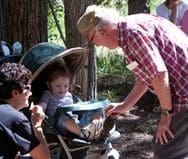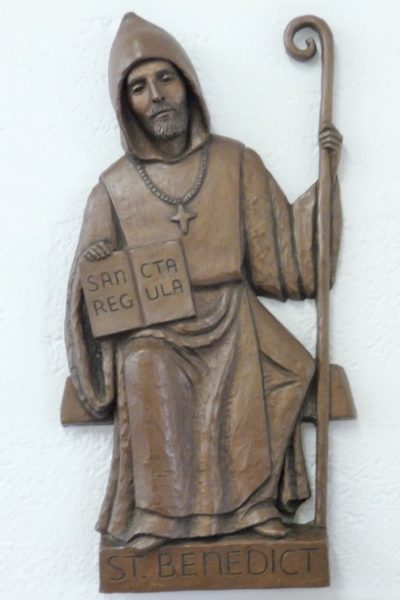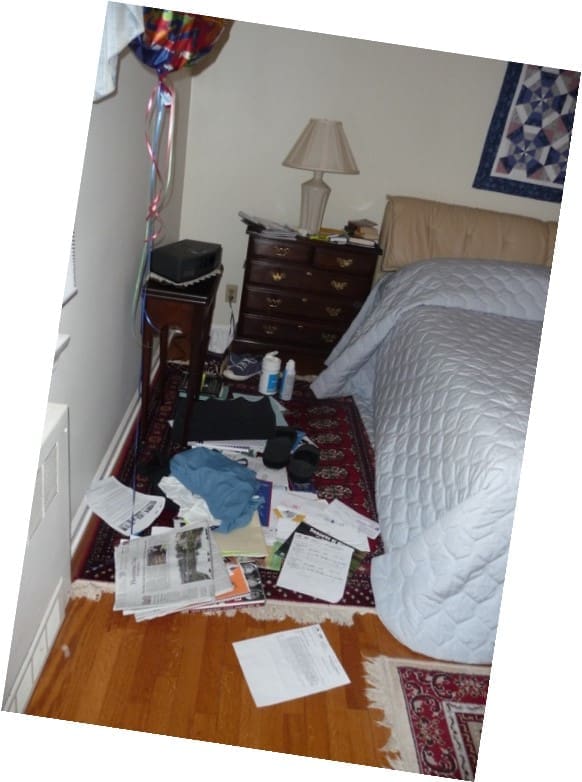A Sampler of Retreats and Programs
Online or On Site
Programs can be customized to suit the specific needs of your group.

Benedictine Spirituality for the Frazzled: Tools for Meeting the Stresses of Life
How is your day going? Stressed? Perhaps you or members of your community feel the “frazzle” so common in our lives today.
At this program we will invite St. Benedict and his Rule to be our guide towards a calmer life. This retreat introduces the basics of Benedictine Spirituality to help meet life’s challenges with grace and joy.
Benedict offers practices like rooting right where we are with full attention to the present moment and adjusting our expectations of ourselves and others. He asks us to find time to pray and encourages us to pray through our tasks. All these help us towards God and a less-frazzled life.
Practical tools will bring the learning alive in your day-today routines. These Benedictine tools focus on living in the present moment, creating a healthier balance of activities in your daily life, and connecting with God through creative ways during the day.

Benedictine Hospitality – Hearts Overflowing with Love
When have you received the gift of open-hearted hospitality? What was that like for you?
Hospitality is a key focus in The Rule of St. Benedict. Presenting hospitality as a holy calling, Benedict writes, “All guests who present themselves are to be welcomed as Christ, for he himself will say, I was a stranger and you welcomed me. (RB 53.1 and Matt. 25:35).
At this program we unpack what it means and looks like to welcome others as Christ. We learn not only how to welcome the stranger but also how to be a welcoming presence to those with whom we share our lives – our family, friends, co-workers and church members.
We explore how the monastic roles discussed in the Rule, such as the porter at the gate of the monastery, can be models for our practice of hospitality. Benedict gives us ways to interact that are grounded in respect and care.
Benedictine hospitality shapes us into channels for God’s love and, in turn, opens our own hearts to God’s love for us.

Finding Joy in Work
Do we find joy in our work? Are we able to draw on God’s presence for strength, patience and creativity?
Every day presents us with a choice. We can do our daily work grumbling or as a gift to God. Most important is who we are as we do our work, whether for pay or as a volunteer.
At this program we will explore the rich and meangful approach ro work found in The Rule of St. Benedict.
Benedict gives us a path to reconnect with God while we work and to discover the holiness in our tasks. We learn that work and the tools we use to do our work are holy and that through our work we glorify God. In the humdrum of our daily tasks we have the opportunity not only to pray, but also to meet God.
Most important is who we are as we do our work, whether for pay or as a volunteer.
In the descriptions of the various roles within the monastery – the superior, the cellarer who distributes goods to the members and the porter who welcomes guests, and even those who serve in the kitchen or tend the sick –we find guidance for how to serve others with an open heart.

Prayer the Benedictine Way
God has placed within our hearts the desire to pray. At this program we will learn about and experience ways to follow the instructions of St. Benedict to “Listen readily to holy reading, and devote yourself often to prayer” (RB 4.55-56).
At this program we learn about and practices different forms of prayer such as the Daily Office, lectio divina (holy reading of Scripture or other books), centering prayer, and unceasing prayer.
We also are invited to share our personal experiences of prayer to learn from each other. Prayer is relationship and communication – our path to a deeper relationship with God.

Forming a Rule of Life
“Rule” is not a popular word in 21st century America, but if we intend to live our lives with purpose and meaning, a structure is needed to guide us in that direction.
At this program we walk through a step-by-step process to begin to craft a meaningful and doable Rule of Life. Forming a Rule of Life is like doing a jigsaw puzzle – one piece goes in at a time until the whole is achieved. We look at personal, relationship and spiritual aspects of our lives to discover both what energizes us and challenges us.
Our goal is to create a Rule of Life that will strengthen our love of God and our availability to God to be Christ’s hearts and hands in this world.
The Rule is not a list tasks to perform but gentle direction on who we are to be. Benedict writes, “Prefer nothing whatever to Christ,” (RB 72.11). This admonition becomes the touchstone of all we are and of all we do.

Benedictine Leadership: Called to be Christ
Today many people outside monastic communities follow the Benedictine model of leadership. Why? The Rule of St. Benedict places the leader’s relationship with God first and follows this with many practical suggestions for respectful, caring, and sensitive leadership.
This retreat presents the many ways that Benedictine leadership calls forth the best in the leader and in the community.
For Benedict, the foundation of leadership is Christ. The manifestation of this is about love and respect of others. Benedictine leadership is about both love and our responsibility to help others become their best selves.
At this program we learn what it looks like to be a Benedictine leader at work, at home, at church, and even in friendships. We study the qualities needed for a leader and how a leader is to interact with those to whom she or he is responsible.
The descriptions of the superior of the monastery serve as models for empowering others and fostering healthy community. The leader’s own search for God and the good of members of the community are placed in the forefront of Benedictine leadership.
Benedictine sister Joan Chittister wrote that the purpose of Benedictine leadership “is not intent on making things right; leadership is intent on making life right.” (The Rule of Benedict, 49)
Come and learn the many ways that Benedict’s leaders can help us to be better leaders today.

Healing Community and Relationships
Are you part of a relationship or community that needs healing? Is there tension among people, distrust, or the inability to listen to each other?
Some of the biggest challenges in life are in stressful relationships and dysfunctional communities. How to create healthy communities and relationships are key areas of focus in the Rule and in Benedictine living.
This program explores the many ways that we can be a healing presence to others, opening up a path to change. We unpack Benedict’s vision of healthy community and how to move towards this goal in our communities and relationships.
Benedict sets a direction for building community that begins with a call to be a peacekeeper and peace-maker (Prologue 17). Practical ways include consideration for each other, love, faithfulness to each other and the community, respect and forbearance to name just a few. The Rule is a treasure trove of ways to bring Christ’s love for us to others.
Healing communities and relationships is a daunting task. Who we are in the midst of these situations can be a powerful agent towards change and health.

Centering Our Hearts In Christ – The Path of Benedictine Spirituality
At this retreat you will both learn about and experience Benedict’s path to centering your life in Christ. Benedict asks us to prefer nothing whatever to Christ and then shows us how to do just that.
The cornerstone teaching of the retreat are the practices from Benedictine spirituality that promote balance, moderation, and living in the present moment. Te Benedictine way is a life centered and rooted in Christ.
There will be instruction on Benedictine prayer, time for prayer and instruction from the wisdom of St. Benedict as he addresses caring for self as well as for others.

Moderation in The Rule of St. Benedict: Choosing the Middle Way
Moderation may be a little known practice in the 21st century especially when it comes to work, acquisition, food, clothing, and to just about anything. We can even get caught up in the “Who-Can-Do-The-Most” syndrome.
The Rule of St. Benedict offers a different approach, emphasizing moderation in all aspects of life. Benedictine moderation can bring about a sense of peace and an understanding of what really is enough.
At this program we explore the theme of moderation in the Rule of St. Benedict from prayer to dress, from discipline to the proper amount of food. We are given time to reflect on our own lives. Where could Benedictine moderation providing a healing change in our lives? We explore how his instructions can help us towards moderation and simplicity.

Decluttering Life for God: The Benedictine Path of Simplicity
Are you frustrated with piles of physical and mental “stuff?” Are you looking for ways to declutter your life?
At this program we explore the many ways that the Rule of St. Benedict guides us towards a life of greater simplicity and peace. As we sweep away our physical and mental clutter, we leave room for God. We’ll also consider ways to declutter our environment using a method offered by Feng Shui.
The Benedictine way focuses on balance, moderation, prayer, living in the present moment, finding the sacred in the ordinary and honoring our relationships are steps in this sacred path of simplicity.
We reflect on how the wisdom of St. Benedict applies to each of us. We receive tools to help bring Benedictine simplicity into our daily lives. Find the path of wholeness and peace where we “Prefer nothing whatever to Christ.” (Rule, Chapter 72, verse 11)

Living in the Present Moment with the Benedictine Vows
So many of us have our minds in the past or in the future. Benedict reminds us that God is found in the present moment. And living in the present moment will foster a peace-filled and thankful heart.
In this program we unpack the Benedictine vows taken by a monastic and how these can help us to live in the present moment.
St. Benedict asks us to be fully right where we are, not fleeing with physically or mentally. This is the vow or promise of stability. He asks us to listen for what we are called to do (the promise of obedience). Finally, we are asked to be open to transformation more fully into Christ (the promise of conversion of life).
We will explore the Benedictine path of being in the present moment, that holy place where we find and are found by God.

Benedictine Balance: Wholeness in Christ
Life can get out of whack with energies focused in one or two directions. We can neglect other parts of our lives and then wonder why we are exhausted or unsettled.
After attending this retreat we may not be able to do what this woman is doing (neither could Jesus). However, be assured, we will be better able to honor and keep in balance all aspects of our lives.
An important characteristic and quality of life under the Benedictine Rule is that it is a balanced life. All aspects of life are honored and allowed to thrive from physical and spiritual needs to our need for healthy relationships.
This retreat opens up time for us to look at our lives as a whole, notingwhat is life-giving and what saps our energy. We then explore how the Rule of St. Benedict can help us have a figurative balance like the woman in the photo above (this Jesus did!)
Finding more balance in life will open the way to joy.

Benedictine Practices for the Lent or Anytime
St. Benedict included in his Rule a chapter on the observance of Lent, which he felt should really be a year-round endeavor. The practices include prayer, reading, self-denial, fasting, and even refraining from “needless talking and idle jesting.” (49.7)
In keeping with Benedict’s directions this program could take place in Lent or anytime and can be tailored to the community’s needs
Lent offers a specific time frame for learning, growing and connecting. Jane can talk with you by phone or by Zoom and arrange a retreat or program for your community that is tailored to the needs of the community.

Navigating the Chaos with Grace: The Benedictine Path for Connection and Peace-Making
Been in a heated argument recently? Differing views about government, legislation, how children should be raised, how money should be spent and a myriad of other subjects can easily escalate into hurtful and harmful words.
This program will give us insight, understanding and tools to help us navigate today’s volatile topics ranging from family and religion to politics.
We will also address some of the characteristics of our culture which seek to pull us from a peaceful heart, such as over-busyness, technology and the “I-can-do-it-all” syndrome.
Benedict and other contemporary voices of wisdom can help us learn to be a presence of grace and hope as we struggle with others over the issues and conversations of today.
We can become peace-makers centered in Christ, and in the process, receive the gift of maintaining our own sanity!

Benedictine Spirituality and the Arts: Channels of Grace for Daily Living
One of life’s joys is to experience the arts—music, fine art, architecture, poem and story. Yet, the arts do more than provide an experience of beauty. They are God’s Presence and Spirit touching a place deep within us to bring peace, energy and hope.
The arts are a spiritual resource for our journey.
Looking at the world through the eyes of the artist can help us discover the sacred in the ordinary. What is the painting above about? What is its mood and purpose? How might the painting speak to our own spiritual journey? Could we place ourselves in the painting and let it speak to us?
At this retreat we will experience different forms of the arts – music, fine art, poetry, prose, and architecture – and explore how each can draw us into a deeper relationship with God and a greater awareness and appreciation of the grace and beauty around us.
Benedictine Spirituality provides practices that can help us move deeper into the beauty and appreciation of art and of life.
